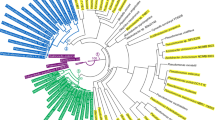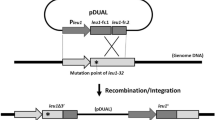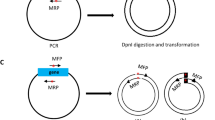Abstract
MINIPLASMIDS, containing only an origin of replication and plasmid-coded functions necessary for plasmid replication and maintenance have been isolated from larger plasmids1. The technique used was to cleave the parent plasmid with the restriction endonuclease EcoRI and reanneal and ligate the fragments so generated in the presence of another EcoRI-generated fragment of DNA coding for a β-lactamase. This second fragment was not capable of self-replication but hybrids between it and a plasmid fragment which was able to replicate could be detected because calls of Escherichia coli transformed with such hybrids would be resistant to ampicillin. We have used the same technique to isolate minichromosomes from the total chromosomal DNA of E. coli K12 and have found that two different chromosomal EcoRI fragments can function as autonomously replicating plasmids. One type of plasmid is indistinguishable from that isolated independently by Yasuda and Hirota2 and contains the origin of replication normally active in chromosome replication termed oriC (refs 3–6). The other type, which we call oriJ plasmids to distinguish them from oriC plasmids, are described below. Both types can be isolated from a single strain of E. coli and they contain chromosomal DNA which is not homologous in DNA · DNA hybridisation studies. Consequently we conclude that the E. coli K12 chromosome contains at least two segments of DNA capable of self-replication.
This is a preview of subscription content, access via your institution
Access options
Subscribe to this journal
Receive 51 print issues and online access
$199.00 per year
only $3.90 per issue
Buy this article
- Purchase on Springer Link
- Instant access to full article PDF
Prices may be subject to local taxes which are calculated during checkout
Similar content being viewed by others
References
Timmis, K., Cabello, F. & Cohen, S. N. Proc. natn. Acad. Set. U. S. A. 72, 2242–2246 (1975).
Yasuda, S. & Hirota, Y. Proc. natn. Acad. Sci. U. S. A. 74, 5458–5462 (1977).
Marsh, R. C. & Worcel, A. Proc. natn. Acad. Sci. U. S. A. 74, 2720–2724 (1977).
Von Meyenburg, K., Hansen, F. G., Nielsen, L. D. & Jørgensen, P. Molec. gen. Genet. 158, 101–109 (1977).
Fayet, O. & Louarn, J. M. in DNA Synthesis—Present and Future, 27–31 (eds Molineux, I. & Kohiyama, M. ) (Plenum, New York, 1978).
Hiraga, S. Proc. natn. Acad. Sci. U. S. A. 73, 198–202 (1976).
Clewell, D. B. J. Bact. 110, 667–676 (1972).
Clewell, D. B. & Helsinki, D. R. Proc. natn. Acad. Sci. U. S. A. 62, 1159–1166 (1969).
De Vries, F. A. J., Collins, C. S. & Jackson, D. A. Biochim. biophys. Acta 735, 213–227 (1976).
Bachmann, B. J. Bact. Rev. 36, 525–557 (1972).
Marmur, J. J. molec. Biol. 3, 208–218 (1961).
Clark, A. J. J. cell. Physiol. 70 Suppl. 1, 165–180 (1967).
Collins, C. J., Jackson, D. A. & De Vries, F. A. Proc. natn. Acad. Sci. U. S. A. 73, 3838–3842 (1976).
Adams, M. H. Bacteriophages (Interscience, New York, 1959).
Lennox, E. S. Virology 1, 190–206 (1955).
Bazaral, M. & Helsinki, D. R. J. molec. Biol. 36, 185–194 (1968).
Radloff, R., Baver, V. & Vinograd, J. Proc. natn. Acad. Sci. U. S. A. 57, 1514–1521 (1967).
Jeffreys, A. J. & Flavell, R. A. Cell 12, 429–439 (1977).
Southern, E. M. J. molec. Biol. 98, 503–518 (1975).
Murray, K. & Murray, N. J. molec. Biol. 98, 551–564 (1975).
Low, B. J. Bact. 113, 798–812 (1978).
Pritchard, R. H., Barth, P. T. & Collins, J. XlX Symp. Soc. gen. Microbiol. 263–297 (1969).
Nishimura, Y., Caro, L., Berg, C. M. & Hirota, Y. J. Molec. Biol. 55, 441–465 (1971).
Tresguerres, E. F., Nandadasa, H. G. & Pritchard, R. H. J. Bact. 121, 254–261 (1975).
Von Meyenburg, K., Hansen, F. G., Nielsen, L. D. & Riise, E. Molec. gen. Genetics 160, 287–295 (1978).
Messer, W. et al. Molec. gen. Genet. 162, 269–275 (1978).
Low, B. Molec. gen. Genet. 122, 119–130 (1973).
Gottesman, M. M., Gottesman, M. E., Gottesman, S. & Gellert, M. J. molec. Biol. 88, 471–478 (1974).
Green, P. J., Betlach, M. C., Goodman, H. H. & Boyer, H. N. in Methods in Molecular Biology (ed. Wickner, R. B. ) (Marcel Dekker, New York, 1974).
Miller, J. Experiments in Molecular Genetics (Cold Spring Harbor Laboratory, New York, 1972).
Author information
Authors and Affiliations
Rights and permissions
About this article
Cite this article
DIAZ, R., PRITCHARD, R. Cloning of replication origins from the E. coli K12 chromosome. Nature 275, 561–564 (1978). https://doi.org/10.1038/275561a0
Received:
Accepted:
Issue Date:
DOI: https://doi.org/10.1038/275561a0
This article is cited by
-
Rac- E. coli K12 strains carry a preferential attachment site for λrev
Molecular and General Genetics MGG (1981)
-
Identification of a second cryptic lambdoid prophage locus in the E. coli K12 chromosome
Molecular and General Genetics MGG (1980)
-
On the nature of sbcA mutations in E. coli K12
Molecular and General Genetics MGG (1980)
-
Chloramphenicol releases a block in initiation of chromosome replication in a dnaA strain of Escherichia coli K12
Molecular and General Genetics MGG (1980)
-
Location and characterisation of a new replication origin in the E. coli K12 chromosome
Molecular and General Genetics MGG (1979)
Comments
By submitting a comment you agree to abide by our Terms and Community Guidelines. If you find something abusive or that does not comply with our terms or guidelines please flag it as inappropriate.



